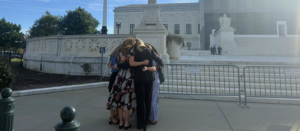When my dad returned from his deployment in Afghanistan, tucked among his belongings was a small stuffed cat. Its stitching was imperfect, its bead eyes unassuming. Back then, I was too young to understand why he had gone. I didn’t understand military strategy, regional instability, or the ideological fault lines that send soldiers like my dad across oceans. I only knew he missed my birthday. I knew Skype calls lagged every time he tried to talk. And I knew, somehow, from that war-hardened place, he had brought something soft home.
That little stuffed cat has become an unlikely metaphor for the contradictions at the heart of war—the way violence and tenderness, hardship and hope, destruction and protection are woven together, however uncomfortably.
Growing up in a military family instills certain lessons early, chief among them that war is necessary because we are human. War is a tragedy because the results are human, too. Sometimes, my dad coming home meant someone else’s didn’t. That reality doesn’t condemn war, nor does it justify complacency … but it is worth remembering.
Watching the simmering tensions between Israel and Iran threaten to erupt into broader conflict, I’ve found myself returning to that memory.
The situation unfolding isn’t a passing dispute or product of misunderstanding. It is the inevitable collision of a democratic state determined to survive, and a regime openly committed to its destruction. Iran’s funding of proxy militias, nuclear ambitions, and theological ideology ensure that this conflict is not theoretical, but existential.
To ignore the threats posed by Iran is not restraint—it is an abdication of responsibility. Peace is not the natural state of the world. It is not kept by sentiment or wishful thinking. It is secured, however imperfectly, through vigilance, deterrence, and at times, decisive action.
There’s a temptation to sanitize these realities with abstractions about “de-escalation” or “mutual understanding,” as though peace is merely the absence of military engagement. The military has been intimately engaged in the Middle East for decades—recent events may make headlines but are hardly novel.
As a child, I couldn’t grasp the geopolitical complexities that deployed my dad. I wouldn’t even try. While enjoying robust debate, war couldn’t be political. Suggesting my dad was a pawn in some grand scheme of the Bush administration was out of the question. No one could convince me that he was missing my life for something doomed to fail—even if it was.
I may not have expertise in Middle Eastern diplomacy, but I thankfully don’t need that to know every soldier and civilian is made in the image of God. It’s easy to get wrapped up in the noise and lose sight of that. To me, soldiers aren’t abstract symbols of policy, they are the dads, moms, brothers, sisters, sons, and daughters from my community. Fear of losing mine—or watching friends lose theirs—brings a level of gravity to these conversations that is often absent from political analysis.
“What if my dad doesn’t come home?” I wonder how many Israeli and Iranian children are asking that same question right now.
With the military lifestyle comes resilience, adaptability, and a deeper understanding of the world’s complexities. But it also brings a sobering truth: the paradoxical reality that the very reasons we sometimes need war—freedom, protection, peace—are also the reasons its consequences haunt us.
I want to be clear—strategic analysis is essential for an effective military. As a military brat, I’d cringe at the thought of replacing critical thought with sentiment … and I’d probably hide this article from my dad, too. But when political climates erupt, social media influencers joke about getting drafted, and reporters become self-declared military experts, I hope we don’t forget that behind every conflict are real people—real families, real sorrows, real lost souls in need of good news—on both sides.
This isn’t a plea for peace, though worth fighting for. It’s not a dismissal of strategic thinking either. It’s simply a reminder that while we dissect policies, someone’s dad or mom won’t make it home for their birthday. Someone’s brother or sister will miss life’s big moments. Someone’s son or daughter will die before they truly get to live. War, in all its horror and necessity, is not fought in the abstract but by, and for, the people we love.
So, whether the headlines prophecy a time for war or a time for peace, I still hold onto that little stuffed cat from Afghanistan. Perhaps because it reminds me that beneath the rubble of politics are real families. Perhaps because I believe that sometimes beautiful things are knit together in the womb of the war machine. Or, to borrow from a favorite author, “Perhaps because I am afraid, and he gives me courage.”[1]
[1] Tolkien, J.R.R. The Hobbit, or, There And Back Again. George Allen & Unwin, 1937.






